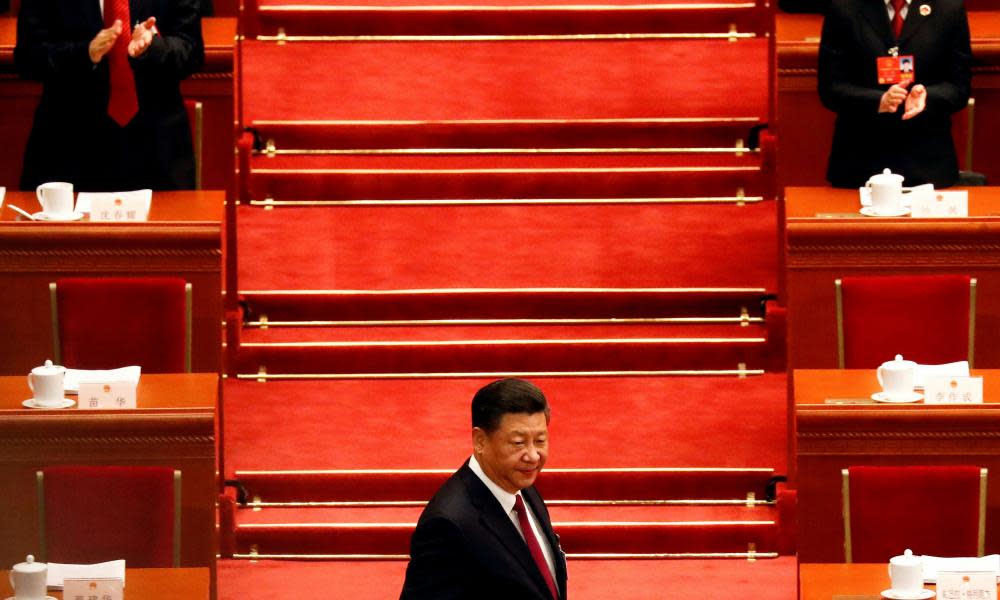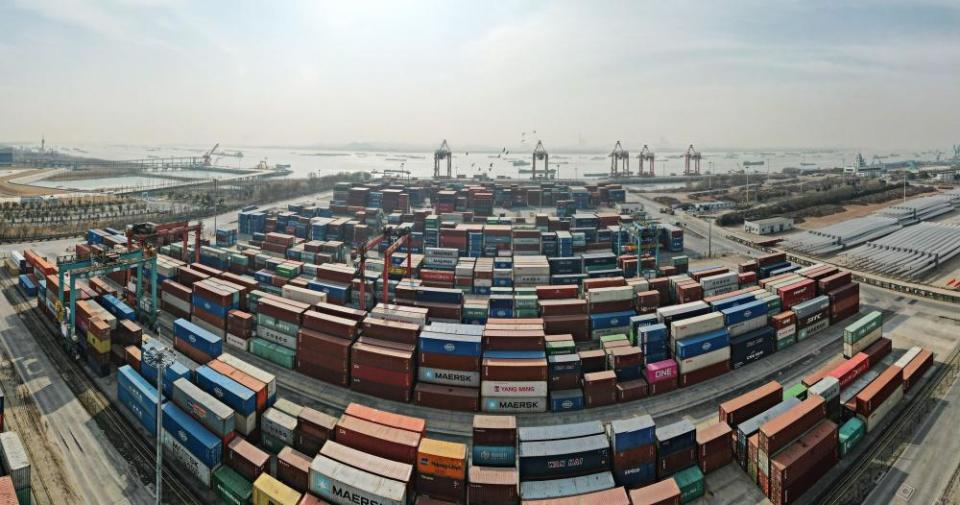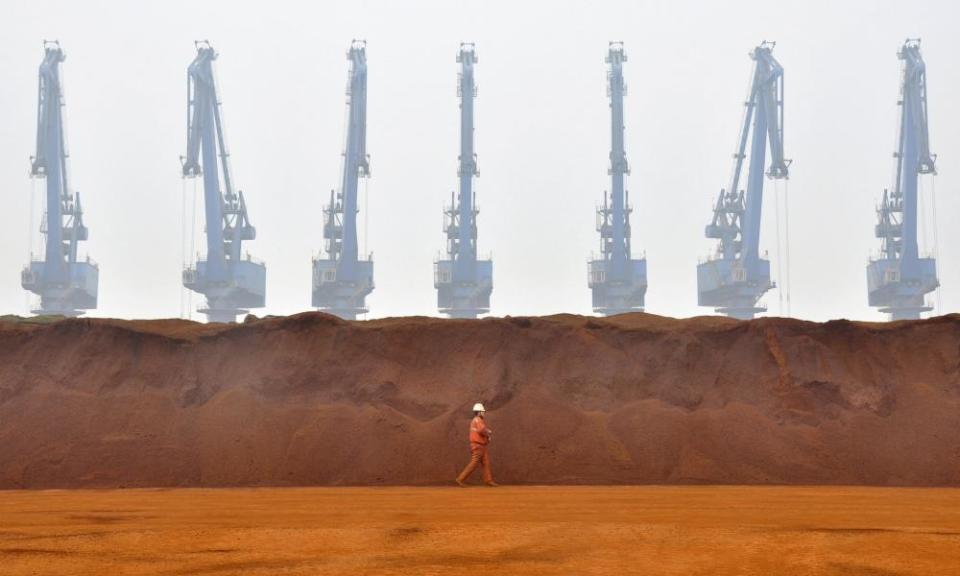Press reset: can the Morrison government rebuild bridges with China – or is it too late?

If anyone was hoping for a breakthrough in the relationship between Australia and China in 2021, the signs are not good. The year has started much as 2020 ended, with dozens of ships carrying Australian coal still stranded off the Chinese coast and with Beijing accusing Canberra of “weaponising” national security by blocking an investment proposal.
While the Morrison government is bracing for a protracted standoff with Australia’s largest trading partner in what officials call “strategic patience”, there are fresh questions as to whether Canberra has a comprehensive plan for managing the relationship with an increasingly assertive and powerful China.
“The problem for Canberra is that we are now [at] the point where relatively simple, low-cost options for resetting the relationship have passed us by,” says James Laurenceson, the director of the Australia-China Relations Institute at the University of Technology Sydney.
Too much politics, too little strategy
Much of the responsibility for resolving the rift now falls to Dan Tehan, who took over as trade minister just before Christmas. He says he will be “patient” and play the “long game” in seeking to ease trade tensions.
Tehan is likely to face the same obstacles that his predecessor, Simon Birmingham, and other Australian ministers have encountered since last year: an effective freeze by the Chinese government on phone calls or meetings at a ministerial level.
He wrote to his Chinese counterpart, Wang Wentao, last week to seek dialogue and to make clear Australia wants a positive trade and economic relationship. Wang, an investor-friendly former governor of the agricultural producing Heilongjiang province, was also appointed as Chinese commerce minister just last month.
“My hope is that with the appointment of a new minister in China at the same time as my appointment, that we will be able to … get a dialogue in the relationship happening again,” says Tehan, whose career history includes a stint at the Department of Foreign Affairs and Trade.

“It’s now well over three years since we’ve had a formal trade ministers meeting with China, and I’m happy to be patient. And I’m not going to put a timeframe on certain things. You know, we have to be prepared to play the long game. I’m more than happy to be patient.”
It is understood the Australian government remains committed to “strategic patience” in the relationship with China, reflecting a view that there is no easy off-ramp to the current tensions and there needs to be a new “settling point”. The type of relationship the two countries had in the past, when it was dominated by the economic ties, is seen in Canberra as unviable.
The prime minister, Scott Morrison, has said Australia wants no part of efforts to “contain” China, but sees the end point as “happy coexistence: respecting each other’s sovereignty and systems and being able to happily coexist in a mutually beneficial relationship”.
China felt targeted by Australia’s public call for a global Covid-19 inquiry, and this was the trigger for the latest round of tensions, but their differences have been mounting over the past five years. The Australian government has been alarmed, and said so publicly, at the repression of Uighurs in the Xinjiang region, the stifling of dissent in Hong Kong, and the militarisation of disputed features in the South China Sea. Beijing has accused Australia of doing America’s bidding and meddling in its internal affairs. China has objected strongly to Australia’s 2017 ban on Chinese telco Huawei from the 5G network, the 2018 foreign interference laws, and the increasingly tight approach to screening foreign investment proposals.
Related: More than 30 countries condemn Australia at UN over high rates of child incarceration
Labor’s Senate leader and foreign affairs spokesperson, Penny Wong, says Morrison needs to work with allied and aligned nations “to deal with a more assertive China and to strengthen the rules of the road”.
But she contends the government has spent too much time on politics and too little on developing a strategy for the China relationship.
“I wouldn’t describe calling for weapons inspectors to enter China, making TV announcements on a Covid inquiry before getting the backing of other countries, or backbenchers pushing for a trade war as ‘strategic patience’,” Wong tells Guardian Australia.
“Scott Morrison talks a big game about protecting our sovereignty, but the reality is Australia is now more reliant than ever on a single market for our exports.”
Too late to reset the relationship
Australian exports to China rose to a record high of $167bn in 2019-20, according to a briefing note from UBS this week. This included the period when trade actions had just begun. Australia’s exports to China have grown from a very low base over the past two decades: they were worth a total of just $8bn in 2000-01. UBS pointed out China is the only major economy to have grown in 2020 – but Australian mining and services sectors “face significant implications from worsening trade tensions”.
Coal exports to China are worth $14bn a year. Apart from coal, China has also targeted Australian barley, wine, red meat, seafood, timber and cotton, with Beijing largely citing technical grounds.
There’s been a lot of discussion about how we might reset the relationship but ... but the question now is how much further things could deteriorate
Prof Jane Golley
Prof Jane Golley, an economist from the Australian National University and director of its Australian Centre on China in the World, says she can’t see any significant change looming for the state of the relationship.
“There’s been a lot of discussion about how we might reset the relationship in the last few years, but it’s gone beyond that. The question now is how much further things could deteriorate, or whether there is scope around the edges to improve the relationship somewhat.”
Golley says China’s dependence iron ore imports provides some constraint to its trade actions, “but in aggregate terms and for virtually all sectors, the simple fact is they matter far more to us in economic terms than we matter to them”.
She fears Beijing may take more trade actions against Australia this year, although “can’t imagine that 2021 could be worse than 2020 in terms of the number of new sectors targeted.”
It’s still unclear, Golley points out, what action China may take against Australia’s important international education and tourism sectors on the other side of the Covid-19 border closures.
And she says it’s “wishful thinking” to expect the arrival of the Biden administration will pave the way for a major breakthrough in Australia-China relations, even though it could open up space for a more cooperative approach on both sides.
With China’s economy predicted to surpass the US economy in nominal terms within a decade, Golley says Australia should find flexibility in its own policy approaches as it “grapples with the world as it is, not as we want it to be”. That should be underpinned by clear-eyed, fact-based analysis.
“My point is never that the Chinese economy matters a lot to us and therefore we have to kowtow to them and do their bidding. It is simply that we have to factor that very carefully into any strategic decisions we make because jobs are on the line.”
Related: Australian government raises fears about the 'human cost' of China coal standoff
The Australian government welcomes the prospect of closer coordination with the US under the new Biden administration, which has flagged a more strategic approach in partnership with allies like Australia. While Morrison believes this could possibly change some of the atmospherics in the region, there is an understanding in Canberra that the politics in Washington have shifted and America is set to remain in a competitive posture towards Beijing.
In a sign of that shift, Biden’s pick for secretary of state, Antony Blinken, told a Senate confirmation hearing this week that although he disagreed with Trump’s methods, the former president had been right to take a harder line towards China. Blinken also backed outgoing secretary of state Mike Pompeo’s last-minute declaration that China was committing genocide in Xinjiang – something that triggered new Chinese sanctions on Pompeo and other Trump officials. Still, Blinken has previously expressed an interest in carving out areas of potential cooperation with Beijing, such as on climate change and pandemic preparedness.
Australia must back up sincerity with action: China
Guardian Australia put a series of questions to the Chinese embassy in Canberra, including what steps it wanted Australia to take and what steps China was prepared to take in order for the relationship to improve in 2021.
The embassy says its position on bilateral relations is consistent and clear. It points to recent remarks from China’s foreign minister, Wang Yi, who said both countries were “members of the larger Asia-Pacific family” with highly complementary economies.
“Australia should seriously consider a question: Is China a threat or a partner to Australia?” Wang said last month.

“If Australia sees China as a threat, how can China-Australia relations improve? If Australia regards China as a partner, we have the basic premise for dialogue and cooperation. The current difficulties in China-Australia relations is not what China wants to see. We still hope that China-Australia relations can return to the track of normal and healthy development.”
China’s foreign ministry argues diplomatic channels for dialogue have been “unimpeded” but that Australia should demonstrate “sincerity with concrete actions” as a prerequisite for closer engagement. Essentially, it insists the ball is in Australia’s court.
Laurenceson says strategic patience “remains feasible for the time being”.
“On the economic front, Canberra will have noted that Beijing has apparently decided it can’t do without West Australian iron ore, and this meant that despite all the goods that were hit with restrictions, the total value of Australia’s goods exports to China last year were only down 4% in $US terms,” Laurenceson says.
“That made 2020 [calendar year] the second highest annual total ever.”
Laurenceson says the Morrison government would be aware that Australian public opinion has swung in firmly behind it, with “a greater political risk associated with being seen to be soft on China than in maintaining a hard line”. But he says that public support might start to flag when it becomes clearer that other countries “are starting to gobble up our share of the Chinese market”. That may only become obvious “over a time horizon of years rather than months”.
“The idea that western countries are going to form an ‘economic alliance’ directed at China strikes me as being pie in the sky wishful thinking,” Laurenceson says.
The fundamental challenge, he says, is that China has formed the assessment that Australia is so firmly in the US camp “that there’s no point cutting us favours or extending us the benefit of the doubt”.
Laurenceson says that will be a tough perception to overcome, partly because “Australia’s historical fear of abandonment will prompt us to want to cleave ever more tightly to the US alliance”.
The opposition has been largely on board with the government’s approach to China, while criticising some of its language or tactics.
Related: Australia urged to ramp up assistance to Hong Kong people amid mass pro-democracy arrests
Wong says the government should deepen its partnerships within the region to secure Australia’s interests and ensure it is a credible partner of choice.
She also believes Australia should “work within the US alliance to ensure effective and strategic engagement within the Indo-Pacific and particularly with the south-east Asian nations, and to hold countries to account for their commitments”.
For now, Tehan is keeping his cards close to his chest. Australia is open to launching further challenges against China’s trade actions through the World Trade Organization, beyond the barley case started by Birmingham, but won’t rush into it.
He talks about playing the long game – but what, exactly, is Canberra’s goal? “Obviously the endgame is we want very constructive engagement with China across the board,” Tehan says.

 Yahoo Movies
Yahoo Movies 
